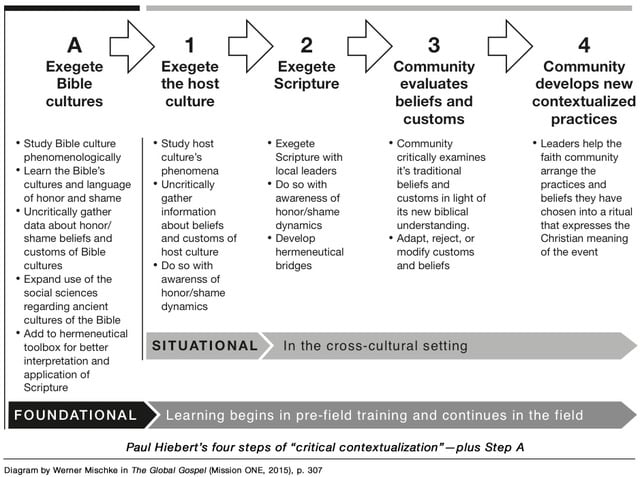Honor/Shame Dynamics in Our Training

(an excerpt from The Global Gospel by Werner Mischke, chapter 4.2)
One of the most widely accepted models for contextualizing the Christian faith was developed by the acclaimed missiologist Paul Hiebert. He called it “critical contextualization”. It has four steps.1
Step 1: Exegete the host culture. Cross-cultural workers study the culture phenomenologically. Suspending judgment, they gather information about beliefs and customs of the host culture.
Step 2: Exegete Scripture. Local leaders and cross-cultural workers together find bridges from Scripture back to the host culture; this is known as the “hermeneutical bridge.”
Step 3: Community evaluates beliefs and customs. The community critically examines its beliefs and customs in light of its new biblical understanding. The community may choose to:
- retain the old practice, custom, or belief if it is not unbiblical,
- reject the practice, custom, or belief because it is unbiblical, or
- retain but modify the practice or belief to give it Christian meaning through appropriate rituals, actions, or symbols.
Step 4: Community develops new contextualized practices. Leaders help the faith community arrange the practices and beliefs they have chosen into a ritual that expresses the Christian meaning of the event.
This process may be diagrammed as shown below:

What this approach does not take into account is the Western blind spot about honor and shame. Remember, the majority of Western missionaries—plus a multitude of non-Western Christians trained by Western leaders—have a blind spot about honor/shame as a pivotal cultural value of Scripture.
Therefore, I propose a contextualization process that expands on Hiebert’s model. I make this recommendation with the utmost respect for his work. And in no way am I suggesting that Hiebert was unaware of the importance of honor/shame dynamics in cross-cultural ministry. But I have not yet run across any of his writings that address the blind spot about honor and shame in Western theological education.
With these caveats, I make the recommendation below:

In this diagram I have added a step at the beginning—“Step A: Exegete Bible cultures.”
One might ask, Why add Step A? Would not the average Christian teacher, missions pastor, or cross-cultural worker already understand the cultures of the Bible? Would not the average missionary be able to incorporate the understanding of “Bible cultures” as part of “Step 2—Exegesis of Scripture”? The answer is only partially, since there is a blind spot in Western theology about honor/shame. The majority of Christian education is conducted without an awareness of the Bible’s pivotal cultural value of honor and shame. Consequently, I propose adding “Step A” at the beginning.
In this model, Step A is foundational. Here’s why: 1) Step A is foundational because it is part of pre-field training. 2) Step A is foundational because it is rooted in and promulgated through the academy. 3) Step A is foundational because it advances the Word of God as being primary and first in the contextualization process.
For a free copy of the full chapter from 4.2—“Honor-Shame Dynamics in our Training”, click here.
Learn about Mission ONE’s new honor-shame curriculum serving the global missions community: “Journey of Discovery in Honor, Shame, and the Gospel”.
1. Taken largely from Pocock, Van Rheenan, and McConnell: The Changing Face of World Missions: Engaging Contemporary Issues and Trends (Grand Rapids, MI: Baker, 2005), 337.
This article was submitted by Werner Mischke of Mission One. Mission One is a Missio Nexus member. Member organizations can provide content to the Missio Nexus website. See how by clicking here.


